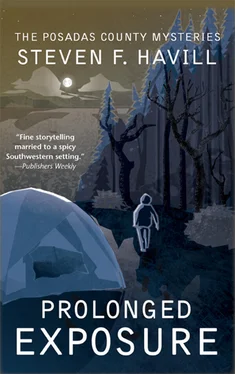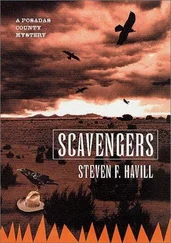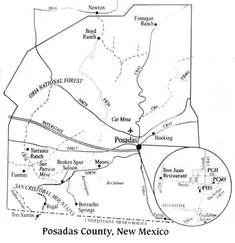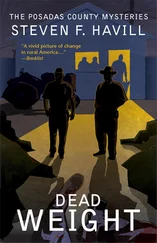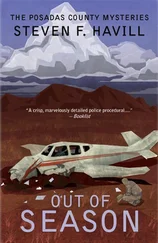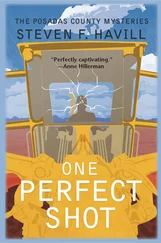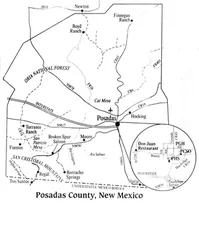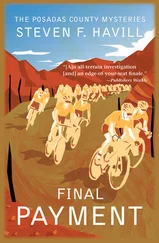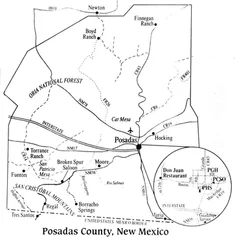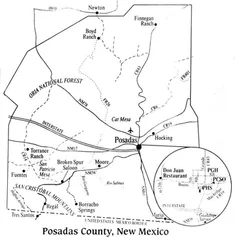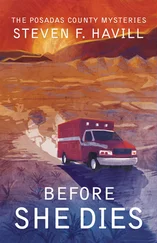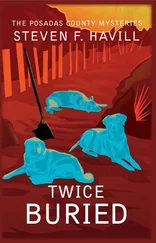Steven Havill - Prolonged Exposure
Здесь есть возможность читать онлайн «Steven Havill - Prolonged Exposure» весь текст электронной книги совершенно бесплатно (целиком полную версию без сокращений). В некоторых случаях можно слушать аудио, скачать через торрент в формате fb2 и присутствует краткое содержание. Год выпуска: 2011, ISBN: 2011, Издательство: Poisoned Pen Press, Жанр: Полицейский детектив, на английском языке. Описание произведения, (предисловие) а так же отзывы посетителей доступны на портале библиотеки ЛибКат.
- Название:Prolonged Exposure
- Автор:
- Издательство:Poisoned Pen Press
- Жанр:
- Год:2011
- ISBN:978-1-61552-231-1
- Рейтинг книги:3 / 5. Голосов: 1
-
Избранное:Добавить в избранное
- Отзывы:
-
Ваша оценка:
- 60
- 1
- 2
- 3
- 4
- 5
Prolonged Exposure: краткое содержание, описание и аннотация
Предлагаем к чтению аннотацию, описание, краткое содержание или предисловие (зависит от того, что написал сам автор книги «Prolonged Exposure»). Если вы не нашли необходимую информацию о книге — напишите в комментариях, мы постараемся отыскать её.
Prolonged Exposure — читать онлайн бесплатно полную книгу (весь текст) целиком
Ниже представлен текст книги, разбитый по страницам. Система сохранения места последней прочитанной страницы, позволяет с удобством читать онлайн бесплатно книгу «Prolonged Exposure», без необходимости каждый раз заново искать на чём Вы остановились. Поставьте закладку, и сможете в любой момент перейти на страницу, на которой закончили чтение.
Интервал:
Закладка:
“No,” I said, stepping carefully. “I don’t know.” I nodded toward the helicopter. “Bent metal over there. Page-one sort of stuff.”
“I got that. I was glad nobody was hurt.” I glanced sideways at her, but she sounded serious. “When did you get back from Wisconsin?”
“Michigan. Yesterday.” I stopped, thinking better of wading through the crowd of people whose attention was focused on the oak grove. I didn’t have any answers or theories, and I wasn’t in the mood to tell the same old story to a dozen of the familiar faces I saw ahead of me-yes, I was back; yes, I was probably still undersheriff, nominally at least; and no, I didn’t have a goddamned clue about what was going on.
Sergeant Torrez and Estelle Reyes-Guzman were in the thick of things, and I hung back, resting under a fat old pinon that knew more than I did.
Marjorie Davis wasn’t so content to loaf in neutral, and when I showed no inclination to move into the center of action, she said, “I’ll talk to you later.”
“Sure enough,” I said, and watched her blend into the crowd.
What had been discovered deep in the little grove of contorted Gambel’s oak dashed everyone’s theories. I watched the ripple effect as word spread out through the assembled people as necks craned and eyes squinted for a look.
It wasn’t much to look at-just a tiny blue coat, western-style yoke, quilted insulation, zipper up the front. The oak grove, a collection of a hundred or two saplings, none of which was more than three inches in diameter, was about the size of half a tennis court. The jacket was a third of the way in on the northwest side.
How it came to be there was certainly not evident, but I was sure the jacket would start a flood of speculation.
I heard Bob Torrez’s voice, and he did a passable imitation of a drill sergeant. “Now listen,” he bawled, and the woods got pretty quiet. “I want everyone who isn’t working law enforcement to step back, then turn and walk back on the trail to the main two-track. We’ve got too many people here, and we’re going to lose evidence. Law enforcement, I want you to just stand still until we get things sorted out.”
I could see by some of the faces that Torrez’s message wasn’t what they wanted to hear. No, by God, they all wanted to stand around and exchange stories about what they thought. I grinned.
In short order, Torrez, Estelle, and a couple of the other deputies and troopers had an orderly line of people walking back the way they’d come, back toward the field of vehicles in the clearing. They looked like a bunch of well-dressed refugees.
I stood where I was, trying to look as inconspicuous as a fat man in a black windbreaker can.
After a few moments, we were left with a grove of oaks, a small jacket, and eight police officers of various ranks and departments-and reporter Marjorie Davis, who made herself small and quiet off to one side, camera at the ready.
I shoved my hands in my pockets and walked slowly toward the yellow ribbon, head down, watching where I put my feet. Dale Kenyon, one of the Forest Service cops, stepped forward and held out a hand. “It’s about time you decided to get back to work,” he said, grinning. “We’re glad you showed up.”
“Thanks,” I said. “I just got in.”
Estelle Reyes-Guzman had picked her way through the oak grove one step at a time, eyes like radar. She knelt beside the jacket and lifted one corner of it with a pencil. “No blood that I can see,” I heard her say. She looked up at Bob Torrez. “Would you have one of the deputies go back to the undersheriff’s truck and get my camera bag?”
“In the clearing by the helicopter,” I said to Eddie Mitchell, and the deputy set off at a fast jog.
I tried to picture a three-year-old dressed in that jacket, trotting down the trail. After a bit, he got warm, and he took off the jacket, dropping it in the center of an oak grove.
A three-year-old, trotting away from camp, at night? Not likely, I thought, and about as likely as him stumbling through all those rough tree trunks to shed the jacket.
“Sir?” I realized that Estelle was looking at me, and when she had my attention, she beckoned.
“Sir,” she said quietly, “doesn’t this look like a knife slice?”
I put one hand on her shoulder and lowered myself to a kneel. She lifted the jacket with the pencil. From the top of the right shoulder, down across the back yoke for perhaps five inches was a deep slice, deep enough that the quilted insulation was seeping out. The deep slice was the second in a series of four cuts, all the others shallower and shorter.
“A little more,” I said, and she lifted the jacket. I peered down, then moved the fabric to one side with a careful finger. “It goes all the way through, but only for an inch or so.”
“And no blood,” Estelle said.
“Right. No blood. And the other cuts don’t even go through.”
She dropped the jacket and tapped her lips with the pencil, then turned and gazed at me. Her voice was so soft that I had trouble hearing, and I bent close.
“Are we supposed to think that this looks like a series of tears from a bear claw, sir?”
I looked at her in surprise, then down at the jacket. The cuts were roughly parallel. And they were clearly blade cuts, not the sort of thing inflicted by a bear claw, no matter how sharp. “Maybe the jacket was torn before. We need to talk with mama.”
Estelle nodded. “Maybe. But these aren’t tears. They’re cuts.”
I held out my hand, and she handed me the pencil. I moved the jacket just enough that I could see the front half, which was on the ground. A single long rent tore the fabric from just inside the left armpit diagonally across toward the zipper, stopping just to the left of center. A portion of that tear penetrated the coat for a distance of an inch and a half, but again, there was no blood.
“I don’t know,” I said. “Under a microscope, you can tell for sure if the fibers are cut or torn.”
“They’re cut,” Estelle said, more to herself than to me.
I pushed myself to my feet with a grunt and twisted at the waist to look at the others. I shrugged and said to Sergeant Torrez, “She’ll want photos of the jacket in place. And after that, we need a shoulder-to-shoulder line to sweep this area. First time through, put the oak grove right in the center of the sweep. See what you can pick up.”
Behind me, I heard Estelle Reyes-Guzman mutter, “They won’t find a thing.” I agreed with her, but at least the maneuver gave the troops something to do. She took photos of the jacket, and Marjorie Davis took photos of her. When it became clear that the searchers weren’t going to turn up anything else, Marjorie walked back toward the vehicles, no doubt with deadlines to meet.
Estelle completed her series of close-up photos, then backed away from the grove and took several more, finally moving so far away that the jacket would be just a tiny touch of blue in the middle of the negative. She stopped at the sound of voices, and we turned, to see Deputy Pasquale walking through the trees toward us, in company with two civilians.
“Great timing,” Estelle said.
Chapter 11
The woman walked with the exaggerated stability of the practiced drunk, her boots hitting the ground flat-footed and graceless. Small wonder, I thought as she drew closer. Her eyes were puffy and red, and despite what her clothing said, she was no more at home in the boonies than I was.
One of the state troopers materialized out of the trees to her left, and the woman startled, almost losing what little balance she had.
I had never seen her before, but I knew her escort. Andy Browers walked at her right elbow, his lean face haggard and pale. He still wore his Posadas Rural Electric Co-op work clothes, now soiled and wrinkled from his long hours on the mesa. Deputy Pasquale, looking fit and eager, rested a hand lightly on the woman’s left shoulder. He steered her over to where I was standing.
Читать дальшеИнтервал:
Закладка:
Похожие книги на «Prolonged Exposure»
Представляем Вашему вниманию похожие книги на «Prolonged Exposure» списком для выбора. Мы отобрали схожую по названию и смыслу литературу в надежде предоставить читателям больше вариантов отыскать новые, интересные, ещё непрочитанные произведения.
Обсуждение, отзывы о книге «Prolonged Exposure» и просто собственные мнения читателей. Оставьте ваши комментарии, напишите, что Вы думаете о произведении, его смысле или главных героях. Укажите что конкретно понравилось, а что нет, и почему Вы так считаете.
